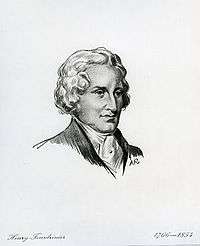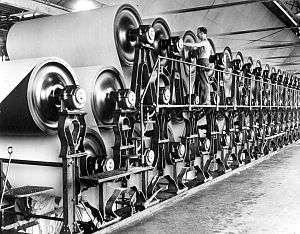Henry Fourdrinier

Henry Fourdrinier (February 11, 1766 – September 3, 1854) was a British paper-making entrepreneur.
He was born in 1766, the son of a paper maker and stationer, and grandson of the engraver Paul Fourdrinier, 1698-1758, elsewhere mistakenly named Pierre Fourdrinier. With his brother, Sealy, he commissioned the development of the Fourdrinier machine, a papermaking machine that could make continuous paper (rolls). A patent was granted on July 24, 1806,[1] for a machine that could make any size of paper, very quickly.

Large rolls are usually sliced into a number of thin rolls, which can feed continuous presses (e.g. newspapers) or be cut into separate sheets.
The invention cost £60000, and caused the brothers to go bankrupt. Due to various laws, it was difficult to protect the patent on the machine, and the new system was widely adopted. In 1814, two machines were made in Peterhof, Russia, by order of the Russian emperor on the condition £700 would be paid to Fourdrinier every year for ten years — but, despite petitioning Tsar Nicholas, no money was ever paid. In 1839, a petition was brought before parliament, and in 1840, £7000 was paid to Fourdrinier and his family.[2]
Fourdrinier died in 1854, at the age of 88.
References
- ↑ Repertory of Patent Inventions. London, 1807
- ↑
 "Fourdrinier, Henry". Dictionary of National Biography. London: Smith, Elder & Co. 1885–1900.
"Fourdrinier, Henry". Dictionary of National Biography. London: Smith, Elder & Co. 1885–1900.